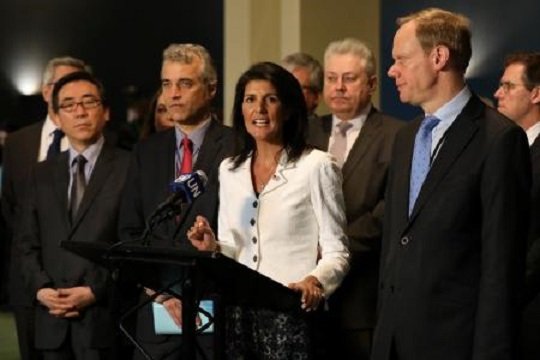
UNITED NATIONS – The United States, Britain and France are among almost 40 countries that will not join talks on a nuclear weapons ban treaty starting at the United Nations on Monday, said U.S. Ambassador Nikki Haley.
Haley told reporters the countries skipping the negotiations are instead committed to the Non-Proliferation Treaty, which entered into force in 1970 and is aimed at preventing the spread of nuclear weapons and weapons technology.
“There is nothing I want more for my family than a world with no nuclear weapons. But we have to be realistic. Is there anyone that believes that North Korea would agree to a ban on nuclear weapons?” Haley told reporters.
The United Nations General Assembly adopted a resolution in December – 113 in favour to 35 against, with 13 abstentions – that decided to “negotiate a legally binding instrument to prohibit nuclear weapons, leading towards their total elimination” and encouraged all member states to participate.
“You are going to see almost 40 countries that are not in the General Assembly today,” Haley said. “In this day and time we can’t honestly that say we can protect our people by allowing the bad actors to have them and those of us that are good, trying to keep peace and safety, not to have them.”
The Trump administration is reviewing whether it will reaffirm the goal of a world without nuclear weapons, a White House aide said last week, referring to an aim embraced by previous Republican and Democratic presidents and required by a key arms control treaty.
Britain’s U.N. Ambassador Matthew Rycroft said: “The UK is not attending the negotiations on a treaty to prohibit nuclear weapons because we do not believe that those negotiations will lead to effective progress on global nuclear disarmament.”
Deputy French U.N, Ambassador Alexis Lamek said the security conditions were not right for a nuclear weapons ban treaty.
“In the current perilous context, considering in particular the proliferation of weapons of mass destruction and their means of delivery, our countries continue to rely on nuclear deterrence for security and stability,” Lamek said.
Beatrice Fihn, executive director of the International Campaign to Abolish Nuclear Weapons, said in a statement: “It is disappointing to see some countries with strong humanitarian records standing with a government which threatens a new arms race.”
Source – Reuters











